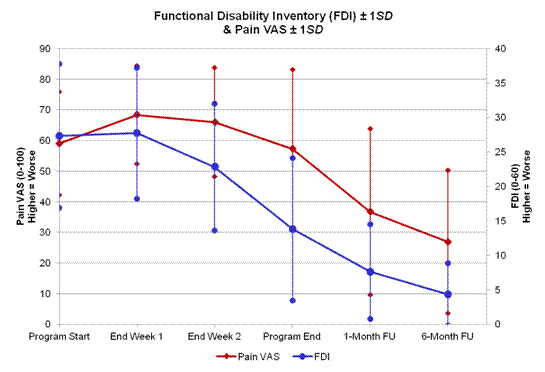Session Information
Session Type: Combined Abstract Sessions
Background/Purpose: We examined the functional, psychological, and pain-related outcomes among children with chronic pain completing an intensive interdisciplinary pediatric pain rehabilitation program. We hypothesized that baseline psychological measures (i.e. anxiety, depression) will predict longer treatment course while baseline pain severity would not correlate with program duration in an interdisciplinary pain rehabilitation program.
Methods: This outpatient program provides 5-6 hours of daily intensive physical and occupational therapy in addition to yoga, self-regulation training, and behavioral health intervention. All pain medications are discontinued, and no invasive therapeutic procedures are utilized. 31 patients (27 female) age 11-18 with chronic musculoskeletal pain completed Functional Disability Inventory, 100 mm Visual Analog Scale, PROMIS Anxiety, Depression, and Mobility, PRCQ-catastrophizing, and the Pain Acceptance Questionnaire for Adolescents at baseline, the end of each week, and 28 have completed a one-month follow-up and 14 have completed a six-month follow-up. Paired samples t-tests and correlations were conducted with SPSS (V.20) and supplemented with hierarchical linear modeling (HLM7) for time-series analyses of pain, functioning, and psychological factors.
Results: The mean program duration was 3.7 (± 0.9) weeks, determined by achievement of functional goals. Using paired samples t-tests, current pain (VAS 0-100) significantly decreased from 59.1 to 36.7 (P<0.001) and 26.9 (P=.004) at 1- and 6-month follow-up, respectively. FDI improved from 27.3 to 13.8 between baseline and program end (P<0.001), and continues to improve at 1- and 6-month follow-up to 7.7 (P<0.001) and 4.4 (P=.006) respectively, reflecting increased physical ability. Patient reported anxiety and depression decline significantly (P<0.001), while pain acceptance increases significantly during treatment (P<.001). Treatment program duration correlated with greater baseline disability (FDI r=.462; P=.009), and presence of conversion symptoms (r=.548; P=.004). Patients with greater pain acceptance (CPAQ-A; r= -.433; P=.015) at baseline required shorter treatment intervention.
Conclusion: Children with chronic musculoskeletal pain successfully restore function and improve pain without pharmacotherapy. Baseline functional disability and psychological factors correlate with treatment program duration. Prospective studies are warranted to determine long-term efficacy and effectiveness of this interdisciplinary program.
Disclosure:
C. Hoffart,
None;
R. Anderson,
None;
A. Chapman,
None;
B. Dorton,
None;
D. Feltrop,
None;
M. Wilson,
None;
D. Wallace,
None.
« Back to 2014 ACR/ARHP Annual Meeting
ACR Meeting Abstracts - https://acrabstracts.org/abstract/child-pain-function-and-psychological-outcomes-in-an-intensive-interdisciplinary-pediatric-pain-rehabilitation-program/

